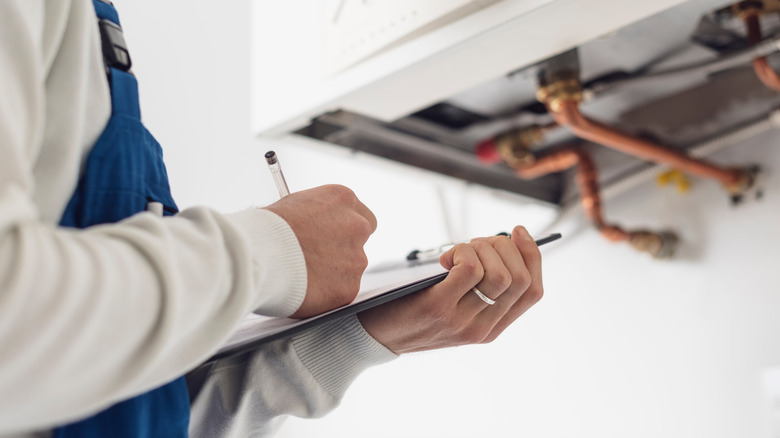5 Savvy Tips For Hiring A Handyperson
Here at House Digest, we love a DIY project, but sometimes you need an extra, experienced set of hands to help you finish up a job around the house. Whether you're planning a full bathroom remodel or simply repairing some old plumbing, it's important to make sure you find a handyperson that's trustworthy, well-priced, and experienced to guarantee your project will go off without a hitch.
This may seem like an easy job, especially with the emergence of helpful online tools and databases; however, it might be more of a complex process than you'd expect, especially if you're new to hiring service workers around the home. According to Zippia, there are over 90,000 handypeople in the United States, each with different levels of experience and specialization. There are a lot of potential hires to wade through, so we decided to share our top tips to help you find and hire a handyperson that's perfect for whatever job you've been looking to complete.
Do your research
It may be tempting to settle on the first person that pops up after a quick Google search, but with 90,000 handypeople to choose from, you can afford to be a little pickier, via Zippia. Take a look at their rates to make sure they're in line with your budget and the average cost for a similar project. Too high, and they may just be looking to take advantage of customers. Too low, and they're probably inexperienced or cutting corners.
Another great benefit of databases and the boundless information available online is customer reviews. A lack of reviews can be a red flag, even if someone looks great on paper. Look for websites that verify that reviews are left by actual customers and find someone that aligns with your goals for your home. A little digging will help you weed out the options that aren't the right fit for you and your project.
Look for licenses and insurance
Licensing requirements for handypeople and general contractors vary by state, but it's best to check if the person you want to hire is officially licensed. Many states don't require a license for smaller jobs, but it can guarantee that this person has the experience and knowledge to tackle your project, via Next Insurance. Look into the requirements for your state and ask the person you're considering to verify their licensing status.
Insurance is another great way to make sure your project is low-risk. Nobody is perfect — sometimes mistakes happen, and unexpected damage occurs on a job. To protect themselves and their clients, many handypeople will invest in a liability insurance plan that can pay out if they're responsible for damages during a project, per Progressive Commercial. This can save you from an expensive lawsuit and guarantees they can finance the repairs. Some websites and businesses even have the bonus of a money-back guarantee if you're not satisfied with the final results. Taking these steps to protect yourself ahead of time can save you a lot of stress down the line.
Be specific
To you, your project might just be replacing a fence, but to a handyperson, a world of details goes into each job. To provide you with a proper quote and confirm that you have the knowledge and tools necessary to complete a task, a handyperson will need quite a bit of information. Specify everything, and if you feel like you've over-explained, keep going. Even a seemingly minor detail can significantly impact what goes into a job, and it can weed out hires that might not be equipped to handle different tasks.
When providing a quote, most handypeople will calculate their prices based on the estimated time necessary to complete a project and the cost of materials they'll need, via Handyman Startup. By being upfront about everything you know about your project, they can give you a more accurate estimate of what everything will cost, protecting you from a surprise bill once everything is completed.
Understand the difference between estimates and quotes
Both an estimate and a quote have to do with the price handypersons charges for a job, but they are very different in practice. According to Consumer Protection, an estimate is the first step. A handyperson will ask questions and learn more about a job or come by to inspect in person. After, they'll provide you with a loose estimate of what you can expect to pay. This is to give you an idea of the cost — it can fluctuate as they gather more information.
A quote, however, is legally binding. After you get an official quote, you are responsible for paying that exact amount. This is where you can haggle a bit and ask questions about specific costs — after that, there's not much wiggle room. Make sure your handyperson gives you a quote early on and in writing. If you're working with only an estimate, they may choose to inflate the price after the job.
Ask questions
When you hire a handyperson, you essentially become their boss. Treat the process like an interview, and don't be afraid to ask questions about their previous experience, the materials they use, and their typical rates. As long as you don't turn it into an interrogation, asking a few questions to confirm you trust this person and their skills are entirely acceptable. If they get uncomfortable or refuse to answer, move on. A handyperson should be used to these questions and willing to provide you with information to make you more comfortable.
According to Thumbtack, the average hourly rate for a handyperson is about $60 an hour. Add in the cost of materials, and you could spend upward of a few hundred dollars on your projects. Because of this, finding someone you trust with the knowledge and experience necessary to complete a job is significant. Prepare and research ahead of time; you can save yourself from damages and additional repairs down the line.





